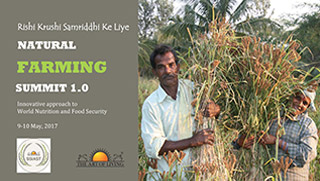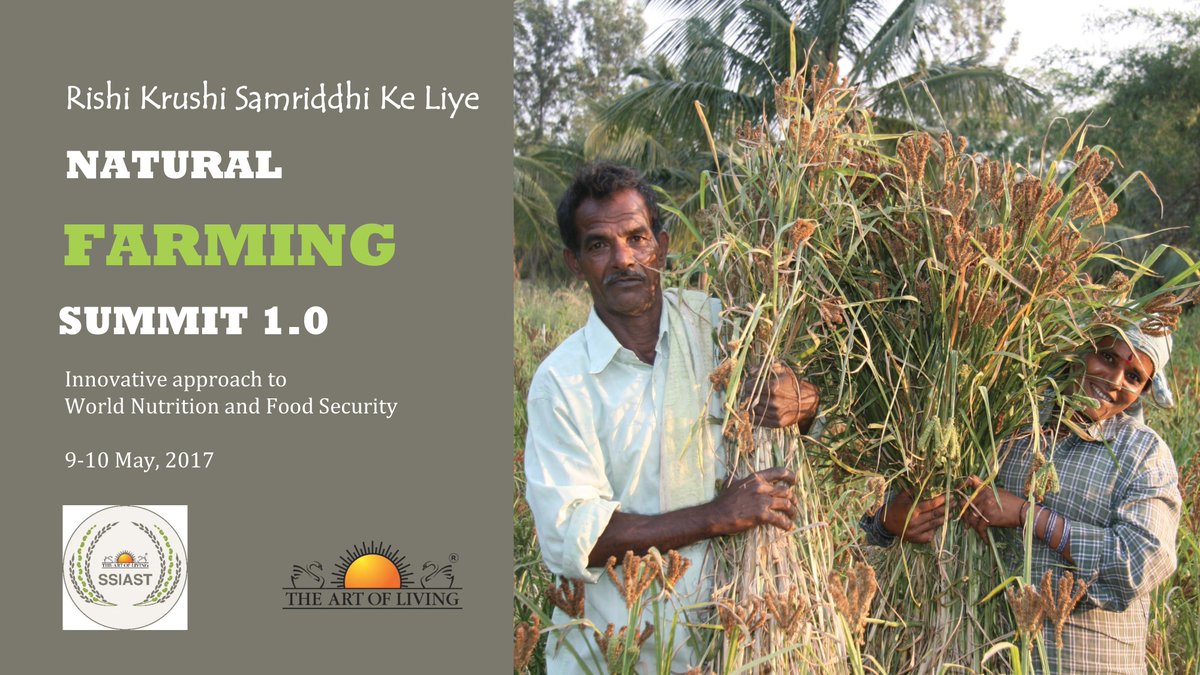In the mean time, the Art of Living decided to organize its annual conference on organic farming (Natural Farming Summit) in early May this year. This proved to be perfect timing for our project as it coincided with Natalie’s field work kick off. The Art of Living foundation, whose work I have been observing and following for over a decade now (and with whom I did a couple of yoga teacher training courses) also invited us to make presentations on our research during the summit. After the conference, I (and other speakers) were interviewed by the Art of Living Bureau of Communications (ABC). I reproduce the text of the interview hereunder:
From the Art of Living Bureau of Communications:
Agricultural Summit on Natural Farming:
The Natural Farming Summit 1.0, organized by the Art of Living Foundation was held on 9th and 10th May 2017 at the Art of Living International Centre, Bangalore. The summit brought together a diverse set of stakeholders engaged in natural and organic farming, and associated sectors of work at both practical and policy levels. The two day summit saw these stakeholders sharing their experiences, research findings and policy recommendations with a rich audience comprising of farmers, distributors, business houses, academic experts, policy makers and NGOs.
The conference participants re-emphasized the benefits of natural farming, including its impact on individual health, quality of soil, improved financial status of farmers and many more. World renowned activist Dr. Vandana Shiva ji, founder of the NGO “Navdanya” also shared her thoughts on how farming which is aligned to nature is the only means of maintaining biodiversity, which is the most urgent need of the hour.
Dr. Mrinalini Kochupillai:
Forums like the Natural Farming Summit are an opportunity to bring together various stakeholders who share a common vision and goal, namely to make the agricultural sector sustainable and prosperous from an ecological, as well as economic perspective. One of our international speakers from Germany was Dr. Mrinalini Kochupillai, who has a masters and doctoral degree in intellectual property law, with special focus on Indian plant variety protection law and policy. According to Mrinalini ji, “practical solutions at the farm level need support at the research and policy level to ensure that socio-economic benefits flow to farmers.” She said that “the farmers of this country have always been innovators – it is unfortunate that following the Green Revolution, the role of farmers was reduced to mere technology takers who sow and harvest crops. In order to re-establish and re-define the role of farmers in the agricultural sector, it is necessary to remind farmers that traditionally, they have always been innovators on the farm – improving traditional seeds in situ and improvising means of maintaining soil health, while also managing pests in an eco-friendly and sustainable manner.” In relation to her current research, Mrinalini Ji said:
[blockquote align=”none” author=”Dr. Mrinalini Kochupillai“]We feel that the work of farmers who are engaged in natural farming using traditional varieties of seeds improved and preserved in situ, is not recognized as innovation. In fact, their work and role in maintaining and enhancing germplasm reserves while ensuring sustainable high yield and nutritive content in the food, has not even been adequately researched!.”[/blockquote] The research project, designed jointly by Prof. Gregory Radick of the University of Leeds and Dr. Mrinalini Kochupillai, which received funding from the Arts and Humanities Research Council, Government of UK in November last year, is perhaps the first qualitative, empirical study into:
(1)Seed exchange and seed saving culture among Indian farmers and how it affects innovation at farmer level;
(2) how the Indian government’s seed replacement policy affects innovativeness among Indian farmers;
(3) the manner in which the Indian Plant Variety Protection law affects in situ agrobiodiversity conservation; and
(4) the relationship between the above and (a) the growing crisis in international agriculture, including (b) suicides by Indian farmers and (c) dwindling number of young people willing to take up a way of life seen as menial labour
Using the funds received, the University of Leeds has engaged a highly qualified post-doctoral research fellow, Dr. Natalie Kopytko, to study innovation among farmers in India, especially farmers who have received training in Zero Budget Farming from the Art of Living, farmers who have won the genome savior community recognition award by the Government of India, and farmers that are engaged in conventional farming using modern seeds.” Mrinalini ji‘s five year long empirical study on the Indian Plant Variety Protection Law and associated governmental policies, conducted as part of her Ph.D. research with MPI, established the basis for this joint research with the University of Leeds. Her research was published by Springer Nature in Max Planck’s Munich Studies on Innovation & Competition series.
Global scenario:
Mrinalini ji shared her thoughts on the scenario in India and the world regarding agricultural technologies, especially new and improved seeds. She said that since the Green Revolution, farmers in India are relying on Universities and large corporations to provide them improved seeds and improved agricultural technology. Undoubtedly, the green revolution increased crop yields in some crops. What policy makers in India have failed to pay adequate attention to, however, is that the green revolution as well as most formal innovations coming from the private sector focus only on specific crops. Food security for the nation and for the globe, however, does not depend on high yield alone, but also on a divserse diet rich in micronutrients, minerals and vitamins that cannot be provided by staple crops such as wheat and rice that the green revolution focussed on. Also, the green revolution made farmers not only reliant on new improved seeds, but also on expensive fertilizers and chemical pesticides that modern science has shown to be extremely damaging to the environment. Indeed, under the green revolution, only few types of seeds were artificially designed to “perform” under the influence of chemical fertilizers. As a result, soils and farmlands where these fertilizers are regularly used, see drop in the yields of other crops whose seeds are not designed to tolerate chemical inputs. The entire strategy for food security and sustainable innovations in seeds therefore needs to be re-thought.
Furthermore, reliance on green revolution and modern “hybrid” seeds that require farmers to replace their seeds each season (by buying new seeds from the marker) is harmful for farmers’ socio-economic status in society. Farmers who are potentially entrepreneurs and innovators, their status in society is reduced to that of laborers that merely sow seeds created by others, harvest crops and sell the yield to make a living. “Our farmers have to go back to the times when they were technology makers, rather than mere technology takers.” She emphasized that “India doesn’t only have religious and cultural diversity – India also has incredible geographic, climatic, biotic and abiotic diversity. If we give this diversity the importance that it deserves, and make our research local, we can export agricultural technology (including seeds, and sustainable pest and soil management technology) to every agro-climatic zone in the world!” She insisted, however, that “India and Indian farmers must stop giving or expecting anything for free. If we are ourselves developing indigenous, ecologically sustainable high yielding seeds of a large number of diverse crops, we also need to be economically aware enough to charge a proper price for it. India’s economic development would then not be dependent on obtaining foreign technology as charity, but on exporting high quality, eco-friendly technology at fair and reasonable price to the rest of the world.” Mrinalini ji shared with our team that she is also inspired by Art of Living founder, Sri Sri Ravi Shankar Ji’s vision of “creating wealth” for all. She said that “we have to use our own traditional systems and traditional values of innovation to create wealth for our farmers and provide food security to the whole world. Any effort or emphasis placed in trying to bring us foreign, non-sustainable technology at cheap rates is not going to help India become economically strong in the long run. Only indigenous, high quality, appropriately priced innovation can bring back India’s lost prosperity. We have to create wealth for ourselves and for the world by using our own intellectual property. Then, those technologies that are developed (and patented) elsewhere, which complement and support our indigenous innovations (e.g. innovations in the digital age) can also be used more meaningfully by our farmer-innovators for further mutually beneficial wealth creation.
The larger project, funded by the UK Arts and Humanities Research Council also seeks to determine the history of India’s ‘Seed Replacement Policy’ and whether farmer to farmer seed exchange was, is, or should be included within this policy. The research project takes forward Dr. Mrinalini Kochupillai’s PhD research in the field of promoting sustainable innovations in plant varieties and Prof. Gregory Radick’s theoretical and conceptual work on Intellectual Property over the long-run of the history of science, and seeks to learn from Art of Living’s vast practical and on-farm work with farmers across the length and breadth of India. Mrinalini ji shared that the innovative potential of the Indian farming community if already clear from the presentations made at the Natural Farming Summit. She said that she got a lot of interesting and insightful information about Indian methods of natural farming and the work of the farming community. “The work and what has been accomplished despite difficult and adverse legal/policy environments is commendable! A truly enriching and eye opening experience!” she said.
Sudarshan Kriya: It is not ‘just Yoga’, it is innovation from India!
“It is a wonder that when 50% of the Indian population is engaged in agriculture or allied activities, agriculture and allied sectors are contributing less than 14% to the Indian GDP. To increase agriculture’s contribution to the Indian GDP, on the international level, Indian farmers can and must become technology makers & know-how suppliers,” remarked Mrinalini ji during her presentation at the Natural Farming Summit. Drawing a parallel with Sudarshan Kriya, she said that “In my view, Sri Sri Ravi Shankar ji is not only a humanitarian leader, but also an innovator. He has created, packaged and disseminated the highly beneficial traditional knowledge based innovation, Sudarshan Kriya, to more than 150 countries around the globe.” ‘Sudarshan Kriya’ is not protected by patent, the name is protected by trade mark and the tapes are protected by copyright. Copyright is considered a relatively weak form of intellectual property protection. Yet, using incredible skill, together with what can be considered the highest form of ‘Corporate Social Responsibility’, Indian innovators like Sri Sri Ravi Shankar have brought the economic benefits accruing from the dissemination of Sudarshan Kriya back to India and to other poor countries of the world – supporting important river rejuvenation projects, organic farming projects, projects for building homes for the poor and many other socially oriented projects. This is the goal that every Indian farmer-innovator should aspire to. We should stop adjudging profit making enterprises as greedy and stop glorifying poverty.” In relation to Sudarshan Kriya, Mrinalini ji said that the variety of projects of global significance that have taken a license to teach Sudarshan Kriya is mind boggling! Yet, India has itself failed to see technologies like Sudarshan Kriya that are widely researched in top scientific institutions around the globe, as Indian innovations! Such innovations based in Indian traditional knowledge ought also to be taken into account by the United Nations or the World Intellectual Property Organization, when they create country rankings for indices such as the Global Innovation Index.
The Munich Conference Series on “Ethics in Innovation: Innovation 4.0”
Mrinalini ji said that “in fact, not just India, but all nations across the world need to re-consider their own approach to identifying, promoting and beneficially disseminating innovations that are unique to their cultures. Encouraging culture specific innovations would not only bring equitable economic development to all nations, but would also increase the choice and diversity available for the citizens of the 21st century multi-cultural global village. This, in fact, is one of the aims with which we are organizing the World Youth Forum for Ethics in Innovation.” According to the write up provided to us by Mrinalini ji, “the fundamental research projects associated with the World Youth Forum for Ethics in Innovation is designed to engage the student participants of the World Youth Forum in multi-disciplinary & multi-cultural discussion to consider three questions that are of significant concern in our increasingly diverse, 21st century global village:
1. How individuals from different cultures, countries & educational background understand the terms ‘ethics’ & ‘innovation’
2. What in their opinion, constitutes an ‘ethical innovation’, including whether a re-assessment is necessary of the manner in which the term ‘innovation’ as currently defined & understood is culturally, socially & economically inclusive.
3. How existing laws, policies & practices can/should be modified to promote ‘ethical innovations’.”
Conferences like these add great value to global knowledge reserves and showcase innovations from different cultures, regions and sectors. We highly encourage everyone to participate in the 1st Ethics in Innovation Conference Series in Munich from 23-27th June 2017.
The research linked with the World Youth Forum 2017 is now being taken forward by Mrinalini ji as a first of its kind open source social science research project. All students, professionals, experts and interested people are encouraged to participate. For more information, see here.





Recent Comments